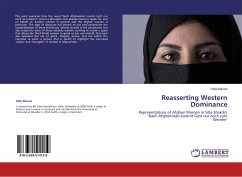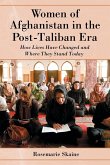This work examines how the novel "Nach Afghanistan kommt Gott nur noch zum Weinen" enters a discussion that already claims to speak for, and on behalf of, Eastern women in general and the Afghan women in particular. This type of discourse has proven to not only perpetuate the marginalization of these individuals, already located in the peripheries, but also erases the voice of those minority women working to create a space that allows the Third World woman to speak on her own behalf. This work also examines the use of space, imagery, power, and sex within the narrative to paint a picture that is meant to highlight the perceived "plight" and "struggles" of women in Afghanistan.
Bitte wählen Sie Ihr Anliegen aus.
Rechnungen
Retourenschein anfordern
Bestellstatus
Storno








